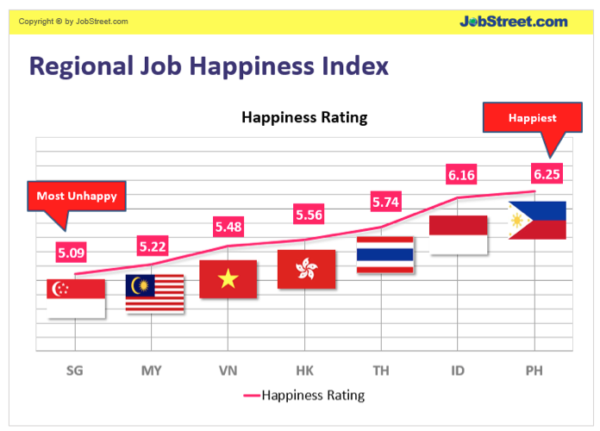Singaporeans are the unhappiest when it comes to job happiness
Have you ever sat at your desk, just waiting to clock out, wishing time would pass faster? Or perhaps, for a large part of the day, you’re browsing through job listing sites like Jobstreet.com, looking for your next dream job? If you answered yes to either question, you’re part of a large group of Singaporeans who are unhappy at their jobs.
According to a recent survey released by JobStreet, Singaporeans were found to be the unhappiest workers amongst six other Asian countries.
On a scale of one to ten in the Job Happiness Index, Singapore scored an average of 5.09, in comparison to the Philippines with the highest average score of 6.25.
67, 764 participants from Singapore, Malaysia, Philippines, Indonesia, Thailand, Hong Kong and Vietnam participated in this survey, which was released on 29 September 2016.
These are the average scores of the participating countries:

Source: JobStreet
Singaporeans expect their job happiness to drop a further 3% in the next six months from 5.09 to 4.93. The survey further concluded that Singaporeans were most pessimistic about their current job prospects. So if you can relate to being unhappy at your current job, you’re not alone in this.
Why so sad?

Source: Thinkstock/Getty Images
According to Randstad’s World of Work Report, 23% of Singaporean workers felt unmotivated and that their skills were not used effectively. 64% of Singaporeans are even planning to leave their jobs in the next 12 months (so don’t feel bad about browsing through prospective jobs while at your current one…).
It seems that the top reasons for job dissatisfaction are:
- Unsuitable corporate culture
- Difficult bosses
- Being asked to do more with less
- Lack of work-life balance
- Lack of management competency
- Lack of promotions and career development
- Poor training and development programmes
What turns that frown upside down?
30% of Singaporeans surveyed felt that getting a new job would help. 20% said that receiving a higher salary would make them happier and 9% believed that receiving recognition from the company could boost their happiness at work.
The reasons that would make an employee happy and stay in a company are:
- Benefits
- Leadership
- Career development
- Job security
- Office culture
- Corporate values
- Work schedule
- Immediate supervisor
Having said that, it is not realistic for employers to meet every single expectation of the employee.
How are some companies keeping their employees happy (or at least, happier)?
So employers, now that you know some of your employees are unhappy, what can you do about it? Unhappy employees equal lower productivity levels, which in turn affect overall company performance. Keep your employees happy and they will help your business grow! If you’re a business owner, maybe you can try exploring some of the ways these companies keep their workers happy.
1. Paid vacations

Source: Thinkstock/Getty Images
Apart from being able to take paid time off, employees of an American marketing and advertising company, SteelHouse, are paid to take vacations.
They are given $2,000 a year to go anywhere they want and do anything they want (anything legal, of course). The employees can choose to spread the budget out across multiple trips or even spend it all at once. Think about it, you would be able to actually take a vacation without having to worry so much about your expenses!
CEO of SteelHouse, Mark Douglas, says “Our culture is really simple. It’s based on trust and ambition”. And this trust goes both ways. In the last three years, only five out of 250 people have left the company and three of whom left due to job unrelated reasons.
2. 5-hour workdays

Source: Thinkstock/Getty Images
The average Singaporean works about eight to nine hours a day and has hardly any time for anything else outside of work, resulting in unhappiness. In fact, it is not uncommon for Singaporeans to compare how much OT (overtime) they are clocking in their respective companies!
However, American beach and lifestyle retailer, Tower Paddle Boards, are truly giving their employees the perfect work-life balance with 5-hour workdays and the same pay. Employees only work from 8am till 1pm, without a lunch break, for a total of 25 hours a week.
Surprisingly, this method has made employees much happier and even made the business grow. CEO and founder of Tower Paddle Boards, Stephan Aarstol, says "I'm giving them this sort of lifestyle where their work week is better than most people's vacation week, but the ask is, 'You need to figure out how to be productive.'"
Bottom line is: more hours don't equal higher productivity.
3. Concierge service

Source: Thinkstock/Getty Images
Singaporean workers are only left with evenings and weekends to do everything they need to do outside of work (eg. Chores, spending time with family, rest).
Multinational professional services firm, Ernst & Young, provides its employees a concierge service to help tackle everyday chores. The concierge service offers everything from flower deliveries to car washes, dry cleaning, booking restaurants and providing onsite massages and physiotherapy, giving employees more time and energy to do things that matter more.
Employees are found to have increased productivity since they are not distracted by their uncompleted errands
4. Pets at work

Source: Google
Having pets are a great way to help destress and put a smile on your face.
Internet giant, Google, allows employees to bring their dogs to work in the USA office. This not only lessens employees’ worries about leaving their pets alone at home, but also keeps them happy and motivated at work.
A study published in Human-Animal Interaction Bulletin showed that those who had played with dogs had reduced stress hormones to the point where they were considered 24% more trusting. It also effectively increases employees’ productivity and company profits.
5. Free flow beer

Source: Thinkstock/Getty Images
Singaporean law firm, Rajah & Tann, keeps their employees happy and looking forward to the weekend by allowing them to enjoy an all-expenses paid free flow beer every “Thirsty Friday”, which happens every alternate Friday. Wouldn’t you be a happy camper in your office with that? We're not advocating (pun intended) alcoholism, but it is great to have something to look forward to after a long work week.
Apart from the free flow beer, the employees also enjoy daily breakfast servings and free lunch once a week. Rajah & Tann even has a foosball table, Nintendo Wii and Microsoft Xbox for their employees to play and relax after tough cases in the courtroom. Where do I sign up?
6. Free childcare

Source: Cherie Hearts
Being able to bring your kids to work will greatly reduce your worries on them and you’ll be able to better concentrate on your work. Local premium childcare, Cherie Hearts, allow employees to enrol their children in the childcare centre they work in for free. Employees will get to monitor their children while working and save money on school fees.
Cherie Hearts is also one of the first few SMEs in Singapore to introduce a 4-day work week without pay or benefit deductions. Employees can request to work from home one day a week, giving them more time to spend with family.
Employees can also bring their family members along on overseas work-related trips. The company will heavily subsidise or even fully pay for the cost of the trip for family members.
(By Samantha Chiew)
Related Articles
- Goldman Sachs and Morgan Stanley adopt AI to help them with recruitment
- Singapore ranked No. 5 city in the world for attracting female entrepreneurs
- Postgraduate degrees = better prospects and pay. Fact or myth?

 Yahoo Finance
Yahoo Finance 
